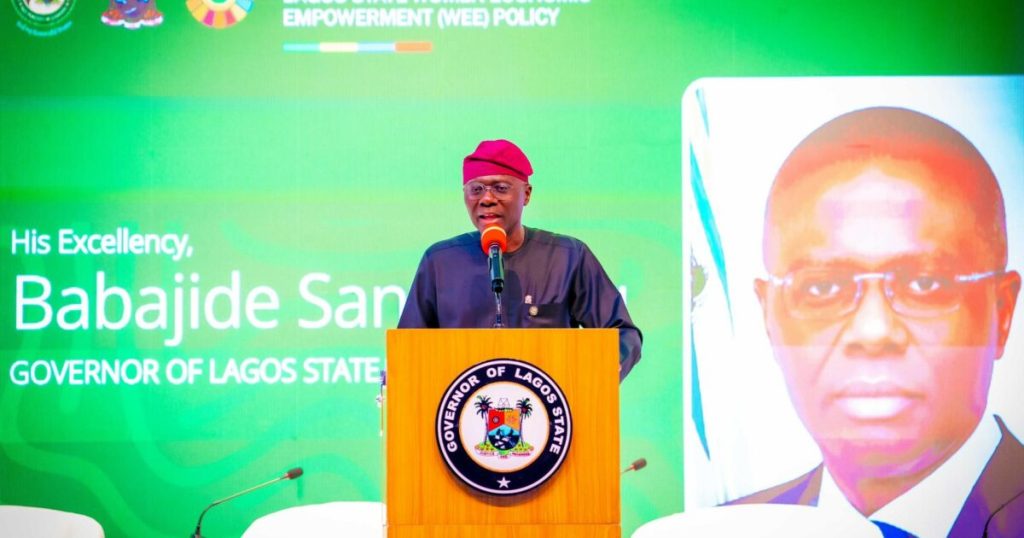The Lagos State government, under the leadership of Governor Babajide Sanwo-Olu, has embarked on a significant initiative to address gender inequality and promote inclusive economic growth through the launch of the Women Economic Empowerment (WEE) Policy Roadmap. This comprehensive policy framework aims to dismantle systemic barriers hindering women’s participation and progress across various sectors, including agriculture, entrepreneurship, traditional and emerging industries, and education. The roadmap represents a crucial step towards unlocking the full economic potential of women in Lagos State and fostering a more equitable and prosperous society. Governor Sanwo-Olu emphasized the importance of this initiative, recognizing that women, constituting nearly half of the state’s population, face significant obstacles that limit their access to education, skill development, financial resources, and participation in diverse industries.
The WEE Roadmap is structured around five key pillars: Agriculture, Entrepreneurship, Traditional Labour Market, Emerging Industries, and Education and Skill Acquisition. Each pillar addresses specific challenges and proposes tailored interventions to empower women and enhance their economic opportunities. In the agricultural sector, the roadmap focuses on increasing women’s access to digital tools, e-commerce platforms, and targeted financing, enabling them to expand their agribusinesses and connect with wider markets. For entrepreneurship, the policy recommends the development of gender-friendly financial services and the strengthening of mentorship networks to support women-led businesses. The roadmap also tackles issues within the traditional labour market and promotes women’s participation in emerging industries, particularly technology, recognizing the importance of digital inclusion and gender-responsive policies.
A cornerstone of the WEE Roadmap is its emphasis on education and skill acquisition. Recognizing the transformative power of education, the policy aims to enhance women’s access to quality education and vocational training, equipping them with the necessary skills to thrive in the evolving job market. The roadmap also prioritizes addressing cultural norms that hinder girls’ education, promoting their participation in STEM fields, and creating legal and infrastructural support systems within the labour market. By focusing on education and skill development, the Lagos State government seeks to create a more level playing field for women and empower them to actively contribute to the state’s economic growth.
The development of the WEE Roadmap involved extensive stakeholder engagement, ensuring that the policy reflects the diverse needs and aspirations of women in Lagos State. Government ministries, private sector leaders, NGOs, community representatives, and women’s groups, including persons with disabilities, participated in the consultations, providing valuable insights and perspectives. This participatory approach ensured that the roadmap is contextually relevant, inclusive, and addresses the specific challenges faced by women across different age groups and backgrounds. Governor Sanwo-Olu stressed the importance of centering women’s aspirations and challenges in policy design, recognizing that empowering women is not just a women’s issue, but a development issue and a moral imperative.
While acknowledging the persistent challenges women face, such as cultural norms, underrepresentation in STEM fields, and legal and infrastructural gaps, Governor Sanwo-Olu expressed optimism about the transformative potential of the WEE Roadmap. He emphasized that the roadmap is not merely a document, but a strategic tool for unlocking the full potential of women in Lagos State. By empowering women economically, the policy aims to uplift individual households, strengthen communities, and contribute to overall economic growth. The governor called for collaborative action among all stakeholders to ensure the full implementation of the roadmap, transforming it from a policy on paper to a living instrument that positively impacts lives across Lagos.
The Commissioner for Women Affairs and Poverty Alleviation, Bolaji Dada, reiterated the significance of the WEE Roadmap as a well-defined strategy to address systemic challenges hindering women’s economic participation. She highlighted WAPA’s commitment to leveraging the roadmap to expand vocational training programs, strengthen micro-enterprise support, foster public-private partnerships, and advocate for policies that benefit women in the informal sector. By empowering women, the Lagos State government aims to create a more prosperous and inclusive society, recognizing that women’s economic empowerment is not only a women’s issue, but a Lagos issue, a development issue, and a moral imperative. The WEE Roadmap serves as a testament to the government’s commitment to gender equity and inclusive economic growth, paving the way for a brighter future for women in Lagos State.


